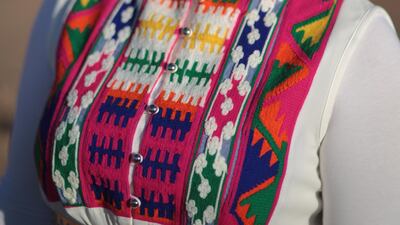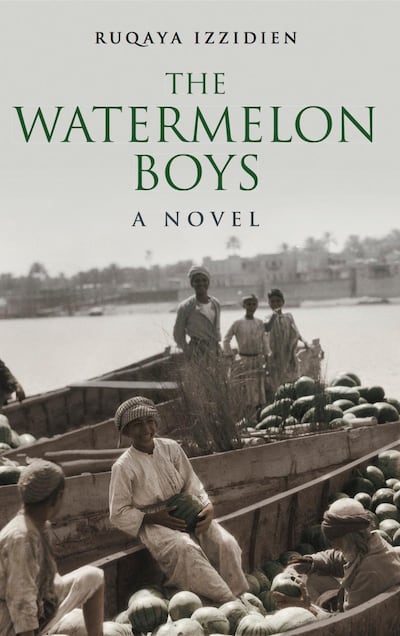Ruqaya Izzidien's debut novel, The Watermelon Boys, opens with an unsettling passage about the ways in which we are all captives of the past. "We are our history; we are the crimes of our ancestors," she writes. "And we wait, mouths agape, to hear tales of hope, as though good could triumph in such a world." Needless to say, what follows is a barbaric tale.
It's set during and after the British-led Mesopotamian campaign in the First World War. Izzidien explores an oft-misunderstood period of modern history, and forces the reader to confront the impact of European intervention in the Middle East, the consequences of which are still being played out today.
"The crimes of that era, even if they have been forgotten by Britain, haven't been forgotten by Iraqis," Izzidien, 31, says. "We need to address the fact that, whether we like it or not, British actions in Iraq during the First World War were used as an instrumental tool for ISIS recruitment.
“We can’t pretend that these wounds haven’t been passed down to the grandchildren and the great grandchildren of the people who lived through that time.”
What is surprising, then, is just how much joy seeps through this dispiriting fog. The Watermelon Boys can, at times, be immensely uplifting. It might recount a series of brutal conflicts and betrayals, but it is, ultimately, a novel defined by love and moral conviction. "It was never actually supposed to be a book about war," Izzidien says. "It's more about a family trying to do the right thing against the backdrop of war."
Beginning in 1915, and interweaving the dual storylines of a family in Baghdad and a young Welsh soldier, Carwyn, who is sent to fight in the Middle East, Izzidien’s novel sets out to reassess the Mesopotamian campaign and the subsequent Iraqi revolt, which erupted when Britain reneged on its promise to support Arab independence in return for support in the war against the Ottomans.
Izzidien tells these stories from the perspective of the Iraqis and challenges the accepted European narrative, in which the British tend to be portrayed as the protagonists and the conquerors. That this feels like a bold thing to do is instructive. We are so used to history being told through a single, fixed – and almost exclusively European – lens that even acknowledging an alternative version strikes us as radical. Yusuf, the young son of Ahmad, the novel's central character, says at one point: "The Ottomans are fighting the English, but all that really means is Arabs on one side are fighting Arabs on the other." Later, in a passage about the Siege of Kut, Izzidien writes: "The world had been so absorbed in the Siege of Kut and the thousands of British men trapped in the town by the Turks, forced to eat their horses and their dogs, that he [Carwyn] had not thought about the residents who were caught up in it, too."
Izzidien’s great triumph is to illustrate how nuanced and knotty history can be – and why it matters that we recognise this. “In British schools, we are only taught about the crimes of others or about British history that is so far back, we don’t have to feel guilty about it,” she says. “This is how we end up with these ridiculous, rose-tinted views of the Empire.”
Literature has a part to play in this, too. When Izzidien, who grew up in Wales but is of mixed Iraqi and English heritage, began researching The Watermelon Boys, she noticed that very few novels about the war in Mesopotamia presented Arabs as anything but "exotic context for the British protagonists". "The focus was on the British," she says. "No-one was addressing what impact this occupation had on Iraqis."
This narrow range of voices is something that afflicts all European literature. “There’s nothing wrong with writing about a different culture, but if you’re writing from without, you need to actually make the effort to understand the culture you’re writing about,” Izzidien says. “You cannot simply write about white people in the Arab world as if they are in some kind of vacuum, as if they have no effect on the people around them. People of this region have stories, they have three dimensions to them.”
After studying modern languages at Durham University, Izzidien, who now lives in Morocco, began working as a journalist in the Middle East, where she regularly reported from Gaza. These experiences helped shape the latter half of The Watermelon Boys. Izzidien draws comparisons between what happened in Iraq during the First World War and what is happening today in the Middle East. It is a piece of historical fiction – "as accurate as a novel can get" – but it is unafraid to look forward as well.
___________________
Read more:
Hanna Mina, Syrian novelist who rejected corruption, dies aged 94
Book review: Washington Black is a slave story told with a fresh sense of urgency
Middle East authors face visa ban from major UK literary festival
___________________
At one point, Izzidien laments the sacrifices made by the characters in her novel who desperately sought independence for Iraq. But she could just as easily – and very deliberately – have been writing about those who were killed during the Arab Spring in 2010. It is a passage that warrants quoting in full: “It is always the young, the brilliant, the most idealistic – the ones who most deserve the world they strive for – who die in the sacrifice,” Izzidien writes. “And the rest are doomed to live in a circle of remorse. Never quite fulfilling their potential, never quite transcending, never quite able to achieve their liberty with the absence of these souls. Always, always on the cusp of what could have been. Oh, God, what we could have been.”
“I was there after the revolution in Egypt and that’s where that passage comes from,” she says. “People who were fighting an idealistic fight and deeply believed in a better future for Egypt, their lives were taken away within seconds. They were the ones who really deserved to witness the fruits of their labour.”
Equally discomfiting is the postscript to the novel, which is a quote from an American officer who served in Iraq in 2003, some 88 years after the events that take place in The Watermelon Boys. "You have to understand the Arab mind," it reads. "The only thing they understand is force – force, pride and saving face."
Izzidien recites this to me, then adds: "We've not really come very far in all these years. What has changed in terms of how the western world views Iraq?" And so we return to the first paragraph of The Watermelon Boys, and think of the next generation, which waits, "mouths agape, to hear tales of hope, as though good could triumph in such a world".
The Watermelon Boys, published by Hoopoe Fiction, is out now




